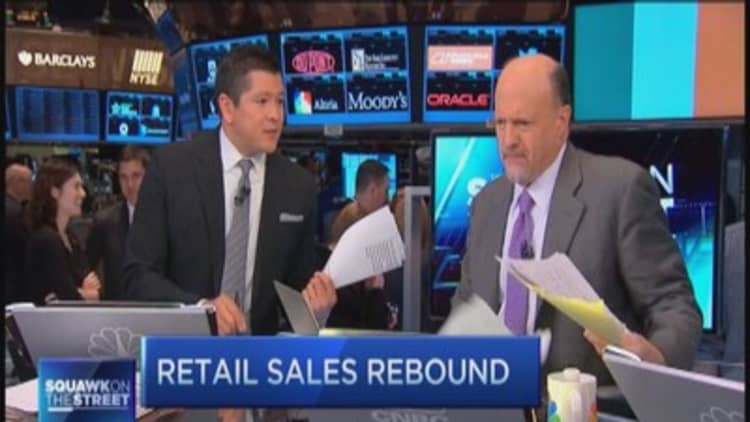So you've just hosted a big holiday bash, and your 50 closest friends have kindly left a living room full of empties and a sink packed with cake-encrusted plates.
You don't have time to clean, but you've heard of this company called TaskRabbit that will quickly send someone to your house for $15, $20 or $30 an hour or more (depending on where you live and whether you want your dishes washed with soap).
Now that you've found a so-called "Tasker" willing to do the job, you have to provide detailed instructions on where to park and what to pick up on the way over. Bleach perhaps? The best option is a phone call, but neither you nor the Tasker want to exchange a personal phone number with a stranger.
Read MorePowering the holidays: The magic behind e-commerce
That's where Twilio enters into CNBC.com's "Powering the holidays" series.
Marketplaces like TaskRabbit, founded in 2008, are popping up every day. Modeled on the success of Uber and Airbnb, start-ups are operating with the thesis that we all have some combination of excess capacity, time and stuff that other people could use. They're matching us up for everything imaginable, creating all sorts of potential privacy and security problems along the way.
Twilio's cloud-based software allows these marketplace providers to enable one-to-one conversations without showing personal numbers. The way TaskRabbit uses it, two parties can chat via text message in an app, and if they opt to start a call, one of them can push a button and Twilio rings both phones.
"They're merged into this magic phone call where the number is never shared," said Kevin Busque, a co-founder of San Francisco-based TaskRabbit and the company's vice president of technology. "It's a great feature for us."
So great that TaskRabbit is sending Twilio, also located in San Francisco, a check every month for thousands of dollars, though not quite up to $10,000, said Busque.
December is TaskRabbit's biggest month, with cleanings as well as gift pickups and returns. There are also jobs ranging from staffing holiday parties to shoveling snow in certain parts of the country.
Twilio was started in 2007, at the dawn of the smartphone era, when most of us were carrying around flip phones and sliders. The business didn't need super high-powered web-enabled devices to make sense, but the emergence of those gadgets dramatically helped expand the customer base.
Read MorePowering the holidays: Lost seconds cost millions
Home Depot's Redbeacon division uses Twilio when it's sending plumbers or electricians out for jobs at customers' houses. EBay's StubHub business counts on Twilio to automate calls to ticket sellers, notifying them of a pending sale. Twilio is how Uber keeps passengers updated on the status of their rides.
Nordstrom recently implemented Twilio to let salespeople communicate directly with customers through a private and secure connection.
The process, hypothetically, goes something like this:
On a warm afternoon in August, a man buys a fancy suit at his neighborhood Nordstrom. He's happy with the service he gets from the salesman, likes his style and attentiveness, enjoys chatting about the weather and his kid's soccer team, and learns that a matching pair of wingtips that he fancies may very well drop in price during the holidays.
The customer can text the salesman to a non-personal number and is then sent a message allowing him to confirm that he'd like to receive mobile messages from the salesman, who's using a Twilio-powered app that Nordstrom calls NEXT. The customer can cancel the service at any time.
Read MorePowering the holidays: You want that parka
November rolls around, Black Friday is days away, and—wouldn't you know it—the price of the dress shoes comes down by 40 percent. The salesman can take a picture of the shoes next to the price tag and send it to the customer with a note saying, "Still interested?" The customer can respond, "Be there in five" or "Buying them from my phone immediately."
"It's about knowing the customer—knowing their likes, dislikes, what inspires them, what to share and what not to share," said Dan Evans, a spokesman at the Seattle-based retailer. "It can be as robust as they want it or it can be once in a while."

Other start-ups are going after this market, with similarly goofy names like Tropo and Plivo. They're younger and lack the expansive brand-name customer base of Twilio. They also lack the funding. Twilio has raised over $100 million, with $70 million coming in a round last year led by Redpoint Ventures.
Twilio Chief Executive Officer Jeff Lawson, a former product manager at Amazon Web Services, said the key to selling enterprise software in today's world is making it super easy to use and letting companies add and reduce capacity as needed in the cloud.
"We let companies burst up on demand whenever they need to," Lawson said. "The cloud completely eliminates the need to do capacity planning."
That's a holiday gift all companies can appreciate.


